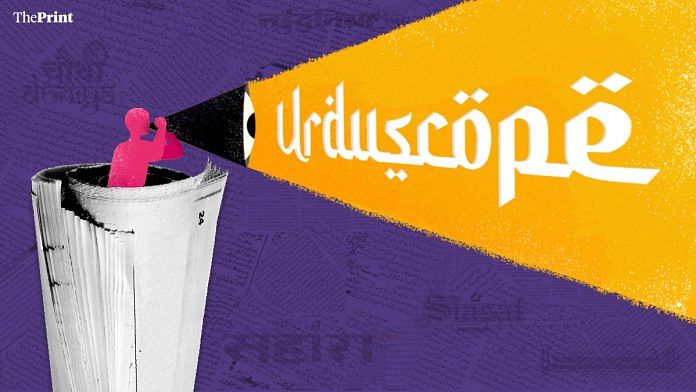New Delhi: The recent uproar over its use notwithstanding, Urdu is a language of rich literary heritage, spoken by over five crore Indians, even though the 2011 Census data also showed how it is now moving on from its traditional bastion of north India (particularly Uttar Pradesh) into the southern states.
ThePrint will do a weekly snapshot of what is being written in the Urdu media, how daily news events are being reported, and the editorial stand taken on some of them.
This is the first edition of UrduScope.
Tripura violence
The violence in Tripura remained in sharp focus in the Urdu press. Last Sunday, 7 November), the front page of Inquilab carried a report on the reactions from MPs across political parties on the police action against members of the fact-finding committee that had visited the state.
Quoting parliamentarians such as P.V. Abdul Wahab and E.T. Muhammad Basheer of IUML, the report spoke about how the MPs were planning to raise the matter in the upcoming Winter Session of Parliament, which begins starts this month.
On Monday, 8 November, Siasat also carried a report on its front page about cases lodged in Tripura under UAPA against 102 social media handles. On the same day, the lead news item in Inquilab was about the “outrage” that had been caused by the move; it also carried the Editors Guild of India statement criticising the move.
On 12 November too, Inquilab ran the news of the Supreme Court admitting a petition on the matter on its front page.
Also read: Muslim group allege ‘political conspiracy’ in Tripura communal violence, claim minority targeted
Hooch deaths in Bihar
The issue of over 30 hooch deaths in Bihar appeared several times over this week in various Urdu newspapers.
In an editorial on 8 November, Inquilab blamed the state government for allowing illegal liquor trade to go on despite the imposition of Prohibition in 2016, and said since CM Nitish Kuma has reaped political benefits from the decision, his government needs to answer questions about gaps in its implementation.
In another report on 10 November, Inquilab wrote about the incident in which BJP MP Sanjay Jaiswal faced anger in Bettiah after handing over envelopes containing Rs 5,000 to the families of those who had died of consuming the poisonous hooch. The paper made the point that when the poor start getting angry, CM Nitish Kumar could end up squandering the political gains of Prohibition.
Nawab Malik vs Devendra Fadnavis
The war of words between Maharashtra minister Nawab Malik of the NCP and former chief minister Devendra Fadnavis of the BJP is being very closely followed by the Urdu press, with every allegation and counter-allegation being reported — from Nawab Malik’s allegation that actor Shah Rukh Khan’s son Aryan was the target of a “kidnapping for ransom conspiracy” (8 November, Siasat) to Malik’s press conference where he alleged that Fadnavis had appointed “criminals” in several government posts (11 November, Inquilab).
The same day, Siasat questioned PM Narendra Modi over a photo that Malik had released, in which Modi was seen with an alleged history sheeter. The newspaper also published on its front page a report (on 10 November) about NCB zonal director Sameer Wankhede’s family members complaining to Governor Bhagat Singh Koshiyari against Malik.
Lakhimpur Kheri
The deaths in Lakhimpur Kheri last month have been in the news across media of all languages, but Urdu newspapers have frequently used the word “murder”, even before forensic evidence emerged about the gun of Ashish Mishra, son of Union minister Ajay Mishra, having been fired.
This development made it to the front page of both Inquilab and Roznama Rashtriya Sahara on 10 November. Siasat led on 9 November with a straight allegation against the Uttar Pradesh government, that it was trying to save the “accused” in the “murder” case.
Demonetisation
The fifth anniversary of demonetisation on 8 November was used by the papers to highlight the lack of any significant progress on the government’s stated goals behind the move. Siasat published a news report on this issue on 9 November, while Inquilab wrote an editorial on 11 November, raising questions about what the lasting positive effect of the move to take vast amounts of currency out of circulation has been.
In its report, Siasat claimed that demonetisation had caused an increase in unemployment and had brought business to a standstill.
Also read: Five years after demonetisation, cash transactions are down but not gone, survey says
International flavour
Siasat’s 8 November front page had the statement of Israeli Prime Minister Naftali Bennet about no American Consulate in Jerusalem for Palestinians. A day later, the newspaper ran on its front page a report of about the decision to allow non-residents to make real estate investments in Mecca and Medina as part of a decision to encourage foreign investments in Saudi Arabia.
India hosting regional talks about the developments in Afghanistan remained in sharp focus on 11 November, with Inquilab highlighting the non-participation of both China and Pakistan. Siasat reported the talks alongside a statement from Defence Minister Rajnath Singh about the tense situation at the borders and the need for the armed forces to remain alert.
Zakia Jafri on Gujarat riots
Both Siasat and Roznama Rashtriya Sahara carried front page reports on 11 November about Congress leader Kapil Sibal’s statement, while representing former Congress MP Ehsan Jafri’s wife Zakia in the Supreme Court in the Gujarat riots case, that communal tension spreads like volcanic lava. Ehsan Jafri was killed in the Gulbarg Society massacre in 2002.
Through her counsel Sibal, Zakia told the apex court that the Special Investigation Team had chosen to turn a blind eye towards important evidence to give a clean chit to Narendra Modi, then the CM of the state, and 64 others.
(Edited by Shreyas Sharma)
Also read: Terrorism, women’s rights, humanitarian aid — Taliban gets stern message from Delhi NSA meet



